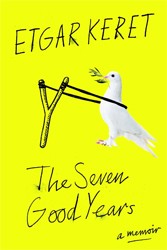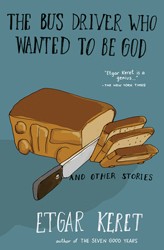1. How were you affected by the way the title story and the closing story, “What Animal Are You?,” describe writers versus audiences? Does the story in “The Story, Victorious” fulfill the high expectations that were set for it?
2. If you were to pull the arm of the gumball machine in “Lieland,” what would you encounter? Who were the most interesting characters in your past lies?
3. Suddenly, a Knock on the Door features many scenes of unresolved love, from Miron in “Healthy Start,” who is willing to get punched for someone else’s infidelity so that he can experience human interaction, to the narrator of “Not Completely Alone,” whose beloved is involved with a married man. Which of the book’s love stories resonated the most with you?
4. Most of the book’s characters face a startling fate: “Cheesus Christ” features a butterfly effect involving clinical depression, miscommunication, and sheer bad luck; Simyon dies in a terrorist attack, leaving behind a widow who barely knew him but will enjoy the pension; Oshri in “Bad Karma” survives when jumper Nattie lands on his head, but Oshri is wistful for his comatose days. What do the book’s death tales tell us about survival?
5. What common traits are shared by all the characters, regardless of whether they are Arab, Israeli, or American? Does gender affect the personalities of the characters, or are the book’s men and women equally neurotic/rational, pushy/passive?
6. How did you react to the final scenes in “Pick a Color” and “One Step Beyond”? What interpretation of God is offered in each of these stories?
7. Reincarnation abounds in this collection, from Bertha in “Bitch,” who becomes a traveling poodle, to Shkedi in “Guava,” who arranges for peace on earth but becomes a terrified guava. if you were to be reincarnated as a nonhuman, what would your best and worst options look like?
8. In stories of punishment, such as “A Good One” (in which entrepreneur Gershon gets clobbered by a security guard while trying to market his board game, “stop — Police”), is there any justice? Or is there only irony?
9. How did the collection’s depictions of children (ranging from “The Polite Little Boy” to the demanding Hillel in “Big Blue Bus”) compare to your memories of childhood? What does Roiki’s story in “Teamwork” say about the way parents explain the world to their children, and the aspects of childhood we never leave behind?
10. Discuss the power and achievements of the hemorrhoid in the story by the same name. Is the hemorrhoid an allegorical character that can teach us important life lessons? Or is it just incredibly funny?
11. Several of the stories address financial issues directly, especially “September All Year Long” and “Grab the Cuckoo by the Tail.” What does say Suddenly, a Knock on the Door about the relationship between wealth and doom?
12. What, of the goldfish, would you wish?
13. In stories such as “Unzipping” and “Pudding,” the characters assume new identities in an instant. How does Keret make his surrealism seem realistic?
14. What universal fears and longings are expressed in the intertwining lives of “Surprise Party”?
15. Suddenly, a Knock on the Door features more than a hundred characters and dozens of sometimes interlocking story lines. What does this indicate about the versatility of short fiction? What can short stories achieve that a novel can’t?





